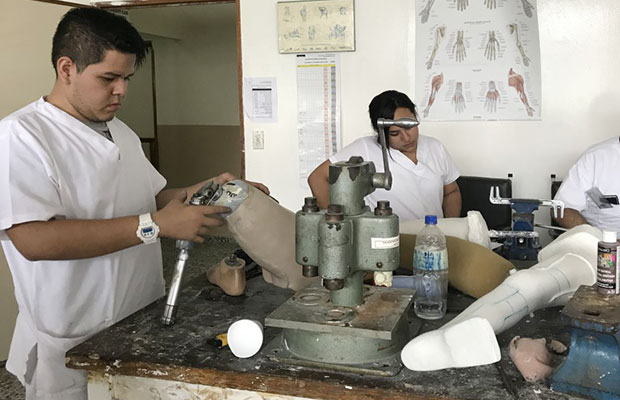
Positive Steps Toward a Future of Inclusion
An estimated one billion people—roughly 15 percent of the world’s population—live with some form of disability. Despite the progress borne of strong advocacy, full inclusion—in the educational system, in job training programs, and in society itself—remains elusive, especially for those living in developing countries. At Don Bosco University in San Salvador, El Salvador, the next generation of medical rehabilitation professionals is learning how to change that, one small step at a time.
Don Bosco University is one of the most prestigious institutions of higher education in the country. It’s also the first university that’s part of the worldwide Salesian University Network to be accredited at the national level. Here, as many as 9,000 students pursue degrees in engineering, social sciences, humanities, economics, aeronautics and other disciplines. Since first establishing the institution in 1984, Salesian missionaries, educators and administrators have been committed to aligning their students’ education with the country’s needs—maintaining close ties to the employment sector and supporting apprenticeship, job placement and career development programs to help graduates succeed.
The University’s “Walking Anew!” project offers a good example.
“With as many as 300,000 people left disabled by El Salvador’s civil war, ‘Walking Anew!’ is a particularly relevant program,” says Father Gus Baek, director of Salesian Missions. “And its students are positioned to make transformative change not only in others’ lives … but in overall attitudes across their country.”
Although El Salvador’s government passed a law requiring “equal opportunity for people with disabilities, access to education, and the opportunity to work” nearly 20 years ago, progress toward these goals has been slow.
Pioneered in 2017 thanks to a grant from USAID’s American Schools and Hospitals Abroad (ASHA) program secured by Salesian Missions, “Walking Anew!” actively supports research and innovation to benefit people with mobility disabilities—and is empowering the next generation of medical rehabilitation practitioners to drive progress in this area.
Don Bosco University already included a School of Rehabilitation Science; ‘Walking Anew!’ is upgrading and expanding upon it. In addition to upgrading over 50 percent of the school’s current technology, the project is currently constructing a two-story building to house more classrooms and an Applied Research Center, where students can collaborate with scientists and educators in the United States. With a focus on mobility disabilities, the new building will contain an updated mobility laboratory and several other new labs which concentrate on orthotics, prosthetics and podiatry. With the goal of broadening the reach for the treatment of people with disabilities, the “Walking Anew!” project will acquire new technology to offer online graduate and specialized educational services across the broader region of Latin America and worldwide.
Last April, 30 students—including 19 women—graduated from Don Bosco University’s orthotics and prosthetics departments, having benefitted from early innovations of the “Walking Anew!” project. Missionaries and educators at the institution are excited to see what’s next for these graduates, and the ones who follow.
“We are thankful for the funding of the ‘Walking Anew!’ project,” says Fr. Gus. “Children living in poverty with a disability are even less likely to attend school when compared to their peers. Youth with disabilities can achieve their goals just like their peers, if given the opportunity. Projects like this help pave the way for advanced research, learning and innovation that helps aid inclusion of people with disabilities.”
Our mission provides equal opportunities for people with disabilities through innovative education and technology. What’s your mission?
Learn more about our work in El Salvador.

